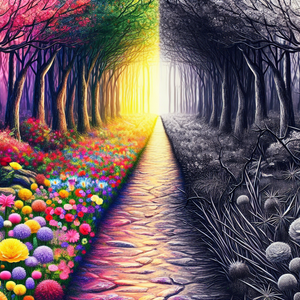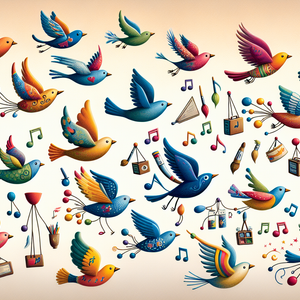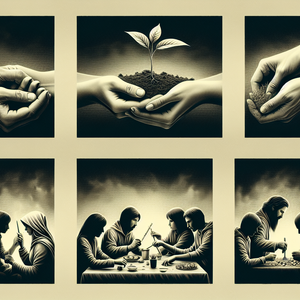The Role of DeviantArt in Mental Health

Art has long been recognized as a powerful form of expression that transcends verbal communication. For many artists on DeviantArt, the act of creating art is a cathartic process that allows them to externalize their emotions and experiences. Artists often channel their struggles with anxiety, depression, loneliness, or trauma into their work. For instance, an artist might craft a haunting piece that visually represents their internal battles with depression, employing dark colors and distorted figures to evoke a sense of despair. This visual language resonates with viewers who may have experienced similar feelings, creating a profound connection between the artist and the audience. The therapeutic aspects of art-making are supported by psychological research, which shows that creative expression can reduce symptoms of anxiety and depression. A study published in the Journal of the American Art Therapy Association found that art therapy can significantly decrease feelings of distress in individuals experiencing mental health challenges. In this way, DeviantArt provides a space where artists can engage in art-making as a form of self-care and healing.
Building a Supportive Community
DeviantArt boasts a vast and diverse community of artists and art enthusiasts. This community aspect plays a crucial role in supporting individuals as they navigate their mental health challenges. Users often find solace in the comments section of their artworks, where fellow members offer encouragement, share their own stories, and validate the artist’s experiences. For example, an artist who shares a piece depicting their battle with anxiety may receive heartfelt comments from others who relate to their struggle, fostering a sense of belonging and understanding. Furthermore, DeviantArt provides opportunities for collaboration and interaction that can help artists feel less isolated. Group forums and themed challenges frequently encourage artists to unite based on shared interests, including mental health awareness. These collaborative efforts not only promote artistic growth but also nurture friendships and support networks that can be crucial for individuals dealing with mental health issues. For instance, the “Mental Health Awareness” group on DeviantArt actively engages members in discussions and art challenges aimed at raising awareness, creating a collective sense of purpose.
Personal Stories of Transformation
Numerous artists on DeviantArt have shared personal stories about how the platform has positively impacted their mental health. One artist described how creating artwork allowed them to process the grief of losing a loved one. By sharing their art and receiving supportive feedback, they discovered a sense of purpose and connection that helped them navigate their grief. Another artist recounted how the community's acceptance and encouragement gave them the confidence to seek professional help for their depression, ultimately leading to a transformative journey of self-discovery and healing. These narratives highlight the profound impact that sharing art and experiences can have on an individual’s mental well-being. They demonstrate that DeviantArt is not merely a platform for showcasing artwork; it is a vital space for emotional expression and support. The stories shared by artists serve as a testament to the community’s capacity to uplift individuals during their darkest moments.
Creating Awareness and Advocacy
DeviantArt also functions as a platform for raising awareness about mental health issues. Many artists use their work to advocate for mental health awareness, crafting pieces that challenge stigma and promote understanding. Artworks depicting mental health struggles in relatable and accessible ways can educate viewers and encourage open conversations about these topics. For example, an artist may create a piece illustrating the feeling of isolation that often accompanies depression, prompting discussions among viewers about their own experiences. By sharing their art, these artists contribute to a larger narrative that fosters empathy and understanding, ultimately helping to normalize discussions around mental health. In a world where mental health stigma still prevails, the art shared on DeviantArt becomes a beacon of hope, encouraging others to engage in conversations about their own mental health journeys.
DeviantArt stands out as more than just an online gallery; it is a vibrant community that plays a significant role in supporting artists’ mental health journeys. Through the act of creation, the nurturing of connections, and the sharing of personal stories, artists find solace and strength within this platform. As we continue to explore the intersections of art and mental health, it becomes clear that DeviantArt is not only a space for artistic expression but also a vital lifeline for many individuals seeking understanding, connection, and healing. By recognizing and embracing the power of art in addressing mental health, we can further enhance the supportive environment that DeviantArt offers, empowering artists to share their stories and inspire others on their paths to wellness. As the community continues to grow, it holds the potential to be a transformative force in the lives of countless individuals, reinforcing the idea that art and connection can be profoundly healing.
Art Therapist
Mental health clinics, schools, rehabilitation centers, and private practices
Core Responsibilities
Facilitate individual and group therapy sessions using art as a therapeutic tool to help clients express emotions and process experiences.
Assess clients' mental health status and develop personalized treatment plans that incorporate creative expression.
Maintain documentation of client progress and adapt therapeutic approaches as needed.
Required Skills
Proficiency in various artistic mediums and techniques (e.g., painting, sculpture).
Strong understanding of psychological principles and therapeutic practices.
Ability to foster a safe and supportive environment for clients.
Community Engagement Manager for Mental Health Organizations
Nonprofits, mental health advocacy organizations, and community health centers
Core Responsibilities
Develop and implement community outreach programs that promote mental health awareness and resources.
Collaborate with artists and community members to organize events such as art exhibits or workshops focused on mental health themes.
Manage social media campaigns to engage the community and encourage participation in mental health discussions.
Required Skills
Excellent communication and interpersonal skills, with an emphasis on community building.
Experience in project management and event coordination.
Knowledge of mental health issues and advocacy strategies.
Digital Content Creator for Mental Health Platforms
Mental health organizations, online communities, and educational institutions
Core Responsibilities
Create engaging multimedia content (videos, articles, graphics) that educates audiences about mental health topics and the role of art in healing.
Collaborate with artists and mental health professionals to highlight stories and promote initiatives within the community.
Analyze audience engagement metrics to refine content strategies and increase reach.
Required Skills
Proficient in digital content creation tools (e.g., Adobe Creative Suite, video editing software).
Strong writing and storytelling abilities, with an emphasis on mental health literacy.
Familiarity with social media trends and audience engagement tactics.
Art Program Coordinator in Educational Settings
Schools, community centers, and youth organizations
Core Responsibilities
Design and implement art programs that promote mental health awareness and emotional expression among students.
Organize workshops and collaborative art projects that encourage creativity while addressing mental health themes.
Collaborate with educators and mental health professionals to integrate art therapy principles into the curriculum.
Required Skills
Background in art education or a related field, with knowledge of therapeutic art practices.
Strong organizational and communication skills, capable of managing diverse groups of participants.
Passion for fostering creativity and mental well-being in educational environments.
User Experience (UX) Researcher for Mental Health Apps
Technology companies, mental health startups, and healthcare organizations
Core Responsibilities
Conduct user research to gather insights on how individuals interact with mental health applications and platforms.
Analyze user feedback to inform design decisions that enhance accessibility and engagement in digital mental health tools.
Collaborate with designers and developers to create user-centered solutions that address mental health challenges.
Required Skills
Strong analytical skills with experience in qualitative and quantitative research methods.
Familiarity with user testing and usability principles, particularly in mental health contexts.
Excellent communication skills to present findings and recommendations effectively.


